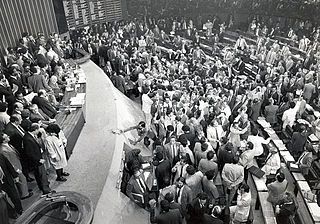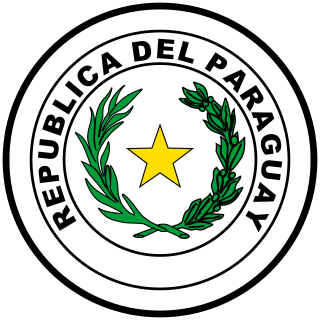The president is a common title for the head of state in most republics. In politics, president is a title given to leaders of republican states.
In political science, a constitutional crisis is a problem or conflict in the function of a government that the political constitution or other fundamental governing law is perceived to be unable to resolve. There are several variations to this definition. For instance, one describes it as the crisis that arises out of the failure, or at least a strong risk of failure, of a constitution to perform its central functions. The crisis may arise from a variety of possible causes. For example, a government may want to pass a law contrary to its constitution; the constitution may fail to provide a clear answer for a specific situation; the constitution may be clear but it may be politically infeasible to follow it; the government institutions themselves may falter or fail to live up to what the law prescribes them to be; or officials in the government may justify avoiding dealing with a serious problem based on narrow interpretations of the law. Specific examples include the South African Coloured vote constitutional crisis in the 1950s, the secession of the southern U.S. states in 1860 and 1861, the controversial dismissal of the Australian Federal government in 1975 and the 2007 Ukrainian crisis.
A presidency is an administration or the executive, the collective administrative and governmental entity that exists around an office of president of a state or nation. Although often the executive branch of government, and often personified by a single elected person who holds the office of "president," in practice, the presidency includes a much larger collective of people, such as chiefs of staff, advisers and other bureaucrats. Although often led by a single person, presidencies can also be of a collective nature, such as the presidency of the European Union is held on a rotating basis by the various national governments of the member states. Alternatively, the term presidency can also be applied to the governing authority of some churches, and may even refer to the holder of a non-governmental office of president in a corporation, business, charity, university, etc. or the institutional arrangement around them. For example, "the presidency of the Red Cross refused to support his idea." Rules and support to discourage vicarious liability leading to unnecessary pressure and the early termination of term have not been clarified. These may not be as yet supported by state let initiatives. Contributory liability and fraud may be the two most common ways to become removed from term of office and/or to prevent re-election

A presidential system is a democratic and republican system of government where a head of government leads an executive branch that is separate from the legislative branch. This head of government is in most cases also the head of state, which is called president.

The President of Brazil, officially the President of the Federative Republic of Brazil or simply the President of the Republic, is both the head of state and the head of government of Brazil. The president leads the executive branch of the federal government and is the commander-in-chief of the Brazilian Armed Forces. The presidential system was established in 1889, upon the proclamation of the republic in a military coup d'état against Emperor Pedro II. Since then, Brazil has had six constitutions, three dictatorships, and three democratic periods. During the democratic periods, voting has always been compulsory. The Constitution of Brazil, along with several constitutional amendments, establishes the requirements, powers, and responsibilities of the president, their term of office and the method of election.

Second Brazilian Republic is the period of Brazilian history between 1946 and 1964 also known as the "Republic of 46". It was marked by political instability and military's pressure on civilian politicians which ended with the 1964 Brazilian coup d'état and establishment of Brazilian military government.

The Brazilian military government was the authoritarian military dictatorship that ruled Brazil from April 1, 1964 to March 15, 1985. It began with the 1964 coup d'état led by the Armed Forces against the administration of President João Goulart—who, having been vice-president, had assumed the office of president upon the resignation of the democratically elected president Jânio Quadros—and ended when José Sarney took office on March 15, 1985 as President. The military revolt was fomented by Magalhães Pinto, Adhemar de Barros, and Carlos Lacerda, Governors of Minas Gerais, São Paulo, and Guanabara. The coup was also supported by the Embassy and State Department of the United States.

During its independent political history, Brazil has had seven constitutions. The most recent was ratified on October 5, 1988.

Artur da Costa e Silva was a Brazilian Army General and the second President of the Brazilian military government that came to power after the 1964 coup d'état. He reached the rank of Marshal of the Brazilian Army, and held the post of Minister of War in the military government of President Castelo Branco.

The 1964 Brazilian coup d'état was a series of events in Brazil from March 31 to April 1 that led to the overthrow of President João Goulart by members of the Brazilian Armed Forces, supported by the United States government. The following day, with the military already in control of the country, the Brazilian Congress came out in support of the coup and endorsed it by declaring vacant the office of the presidency. The coup put an end to the government of Goulart, also known as Jango, a member of the Brazilian Labour Party, who had been democratically elected Vice President in the same election in which conservative Jânio Quadros, from the National Labor Party and backed by the National Democratic Union, won the presidency.

The Constitution of Georgia is the supreme law of Georgia. It was approved by the Parliament of Georgia on 24 August 1995 and entered into force on 17 October 1995. The Constitution replaced the Decree on State Power of November 1992 which had functioned as an interim basic law following the dissolution of the Soviet Union.

Presidential elections were held in Brazil on 15 January 1985, the last to be held indirectly through an electoral college, and the last to be held under the military regime. The electoral college system was put in place so that the military elite that controlled the government could secure the election of the candidate chosen by the High Command of the Armed Forces as President. However, in 1985, due to the process of negotiated transition to democracy that started in the late 1970s, the politicians in the electoral college were placed under no coercion, and were allowed to choose the president of their choice.

João Belchior Marques Goulart was a Brazilian politician who served as the 24th President of Brazil until a military coup d'état deposed him on April 1, 1964. He is considered the last left-wing President of Brazil until Luiz Inácio Lula da Silva took office in 2003.

The Republic of Paraguay is governed under the constitution of 1992, which is the country's sixth since independence from Spain in 1811.
The 1993 Brazilian constitutional referendum was held on April 21, 1993 to determine the form of government of the country. After the re-democratization of Brazil, an article in the new Constitution determined the holding of a referendum for voters to decide if the country should have a republican or a monarchical form of Government, and if the system of Government should be that of a presidential Executive or that of parliamentary government.

A constitutional referendum was held in Armenia on 6 December 2015. Its amendments to the constitution put the country on a course from having a semi-presidential system to being a parliamentary republic, with the changes beginning to take place during the 2017–18 electoral cycle. The referendum passed with 66.2% of voters supporting it. Voter turnout was 50.8%, passing the 33% threshold to validate the results.
Auro Soares de Moura Andrade, commonly known as Auro de Moura Andrade or Moura Andrade, was a Brazilian lawyer and politician. Was born in a wealthy family of farmers from the countryside, son of the cattle rancher Antônio Joaquim de Moura Andrade, known as "The King of the Cattle".























